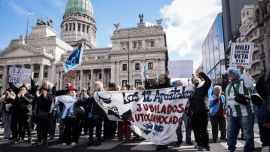The daughter of late footballing icon Diego Maradona told a court in San Isidro on Tuesday his death "would have been avoided" if the doctors caring for him after surgery had done their jobs.
Maradona, one of Argentina's most beloved icons, died on November 25, 2020, aged 60, while recovering at home from brain surgery for a blood clot. He had battled cocaine and alcohol addiction for decades.
The seven-person medical team who cared for him at the end of his life is currently standing trial for what prosecutors have called the "horror theatre" of the final days of his life. They risk up to 25 years in prison if found guilty.
Maradona was found to have died of heart failure and acute pulmonary edema — a condition where fluid accumulates in the lungs — two weeks after going under the knife, according to the autopsy.
"If they had done their job, this would have been avoided," his daughter Dalma Maradona, a plaintiff in the case, told a court in San Isidro, to the north of Buenos Aires.
"They deceived us in the cruellest way," she said of the medical team.
Dalma, 38, testified that physician Leopoldo Luque, one of the accused, had assured the family that home hospitalisation was "the only option” for the ailing star.
She was told her father would have everything he needed, including 24-hour care and an ambulance at the ready.
Expert witnesses, however, have testified that wasn’t the case.
This "never happened," Dalma told the judges on Tuesday. "It was a house where, occasionally, a doctor would come to see him."
After her father's death, she said she found the house "disgusting.” It “smelled like urine,” she added.
Dalma broke down in tears in court as she recalled the moment she found her father lifeless. “I threw myself on him because I thought he would wake up,” she said.
She also said that when the family raised concerns about Maradona’s behaviour, doctors dismissed them, claiming only his daughters noticed anything was amiss.
Dalma claimed she had tried to visit the ex-footballer days before his death, but was denied entry to the house by Maradona's lawyer and an assistant.
The defendants in the case – which include doctors, nurses, a psychiatrist and a psychologist – are accused of homicide with possible malice aforethought, a term which implies that they were aware their actions (or inaction) could contribute to the patient’s death.
An eighth defendant – a female nurse – will be tried separately.
Prosecutors allege the former footballer was abandoned to his fate for a "prolonged, agonising period" before his death.
Maradona’s former partner Verónica Ojeda, the mother of his youngest son, said in witness testimony last week that the late star had “been held hostage” at the rented property near Tigre where he died.
“I knew he was being kept like a hostage – he was afraid of everything. Every time I left, he told me to take him with me,” she told the court.
Ojeda criticised members of the star’s entourage, naming assistants Maximiliano Pomargo and Vanesa Morla, and bodyguard Julio Coria, as individuals who contributed to his isolation. Coria has been accused of perjury during the trial, though none of the three face charges in the case.
She also accused Luque and psychiatrist Agustina Cosachov – both defendants – of deceiving the family. “They lied to our faces – to all of us,” she said.
Before Dalma’s testimony, the court heard from Víctor Stinfale, a lawyer and friend of the late footballer since 1998.
Stinfale said he had taken part in a meeting with family members and doctors where it was decided that Maradona would be discharged to home care.
He said the medical group had stressed at the time that no alcohol should be allowed into the house.
“They worried about Diego’s addiction, but not about his heart,” Stinfale told the court. “The idea that Diego died because nobody checked how fast his heart was beating, or whether it was swollen – as the media have reported – strikes me as monstrous.”
Stinfale said he had brought a physician, Rodolfo Benvenutti, to the meeting, and that the doctor had outlined the kind of medical set-up required in the house, including an ambulance on site.
“None of what was discussed in that meeting ever happened," said Stinfale.
According to Stinfale, Luque was both a friend of Maradona’s and the person tasked with coordinating visits from other specialists.
“The only person who could enter Maradona’s room without risking a slap was Luque,” he said.
Stinfale suggested that no-one had shown the necessary authority in Maradona’s final days. “They were all employees,” he said. “It was very difficult to say no to him.”
Stinfale also told the court that he had visited Maradona on October 30 — the star’s 60th birthday — and found him in a “terrible” state, both physically and emotionally.
He described the footballer as “depressed” due to a personal conflict with his former partner, Rocío Oliva.
“He was taking Alplax like they were Sugus [sweets],” Stinfale said, referring to a brand of anti-anxiety medication and candy.
Nearly 120 witnesses are expected to testify in the long-delayed trial, which is set to run until July.
– TIMES/AFP


























Comments